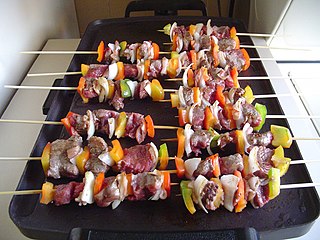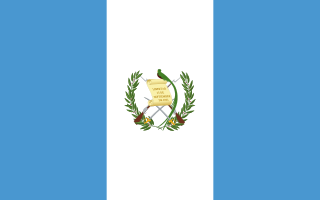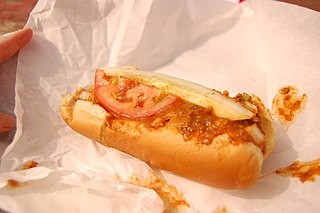Hotspot, Hot Spot or Hot spot may refer to:

Mexican cuisine consists of the cooking cuisines and traditions of the modern country of Mexico. Its earliest roots lie in Mesoamerican cuisine. Its ingredients and methods begin with the first agricultural communities such as the Olmec and Maya who domesticated maize, created the standard process of nixtamalization, and established their foodways. Successive waves of other Mesoamerican groups brought with them their cooking methods. These included: the Teotihuacanos, Toltec, Huastec, Zapotec, Mixtec, Otomi, Purépecha, Totonac, Mazatec, Mazahua, and Nahua. With the Mexica formation of the multi-ethnic Triple Alliance, culinary foodways became infused.

A tamale, in Spanish tamal, is a traditional Mesoamerican dish made of masa, a dough made from nixtamalized corn, which is steamed in a corn husk or banana leaves. The wrapping can either be discarded prior to eating or used as a plate. Tamales can be filled with meats, cheeses, fruits, vegetables, herbs, chilies, or any preparation according to taste, and both the filling and the cooking liquid may be seasoned.

Tamale is the capital city of the Tamale Metropolitan Area and Northern Region of Ghana. Tamale is Ghana's third largest city. It has a projected population of 730,000. Official Website. It is the fastest-growing city in West Africa. It is located 600 km (370 mi) north of Accra. Most residents of Tamale are Muslims and Dagombas by tribe, as reflected by the multitude of mosques in Tamale, most notably the Central Mosque, Afa Ajura Mosque, Afa Basha mosque and The Ahmadiyyah Muslim mission Mosque.
Tamal or tamale may refer to:
Bob, BOB, or B.O.B. may refer to:

The Northern Region is one of the sixteen regions of Ghana. It is located in the north of the country and it is the second largest of the sixteen regions. Until it split, it covered an area of 70,384 square kilometres or 31 percent of Ghana's area. In December 2018, the Savannah Region and North East Region were created from it. The Northern Region is divided into 14 districts. The region's capital is Tamale, Ghana's third largest city.

Hot Tamales is a cinnamon-flavored candy introduced in 1950 manufactured and marketed in the United States by Just Born. They were invented by Bob Born after reworking Mike & Ike Candy. The name derives from the sometimes spicy flavor of tamales. It was the top-selling cinnamon candy in 1999.
Pedro Herrera III, better known by his stage name Chingo Bling, is an American rapper, producer, and comedian of Mexican descent.

Honduran cuisine is a fusion of Mesoamerican, Spanish, Caribbean and African cuisines. There are also dishes from the Garifuna people. Coconut and coconut milk are featured in both sweet and savory dishes. Regional specialties include sopa de caracol, fried fish, tamales, carne asada and baleadas. Other popular dishes include meat roasted with chismol and carne asada, chicken with rice and corn, and fried fish with pickled onions and jalapeños. In the coastal areas and the Bay Islands, seafood and some meats are prepared in many ways, including with coconut milk. Among the soups the Hondurans enjoy are bean soup, mondongo soup, seafood soups and beef soups. Generally all of these soups are mixed with plantains, yuca, and cabbage, and served with corn tortillas.

Most traditional foods in Guatemalan cuisine are based on Maya cuisine, with Spanish influence, and prominently feature corn, chilies and beans as key ingredients. Guatemala is famously home to the Hass avocado.

The mother-in-law is a fast food dish of Chicago, consisting of a tamale topped with chili, served in a hot dog bun. The mother-in-law is made with Chicago's unique style of tamale, a machine-extruded cornmeal roll wrapped in paper instead of corn husks, which is typically cooked in a hot-dog steamer.

Hot Tamale Baby is the fourth studio album by American blues musician Marcia Ball, released in April 1985 by Rounder Records.
Hot or the acronym HOT may refer to:

Guajolota, also known as a torta de tamal, is a form of street food commonly found in Mexico City and within the State of Mexico. It is essentially a sandwich composed of a tamal placed inside a bolillo or a telera, which is a rounder version of a bolillo.

"Here We Go Again" is a country music standard written by Don Lanier and Red Steagall that first became notable as a rhythm and blues single by Ray Charles from his 1967 album Ray Charles Invites You to Listen. It was produced by Joe Adams for ABC Records/Tangerine Records. To date, this version of the song has been the biggest commercial success, spending twelve consecutive weeks on the US Billboard Hot 100 chart, peaking at number 15.

The cuisine of Chiapas is a style of cooking centered on the Mexican state of the same name. Like the cuisine of rest of the country, it is based on corn with a mix of indigenous and European influences. It distinguishes itself by retaining most of its indigenous heritage, including the use of the chipilín herb in tamales and soups, used nowhere else in Mexico. However, while it does use some chili peppers, including the very hot simojovel, it does not use it as much as other Mexican regional cuisines, preferring slightly sweet seasoning to its main dishes. Large regions of the state are suitable for grazing and the cuisine reflects this with meat, especially beef and the production of cheese. The most important dish is the tamal, with many varieties created through the state as well as dishes such as chanfaina, similar to menudo and sopa de pan. Although it has been promoted by the state of Chiapas for tourism purposes as well as some chefs, it is not as well known as other Mexican cuisine, such as that of neighboring Oaxaca.
The Very Best of Santana – Live in 1968 is a live album by Santana, recorded in 1968 and released in 2007 on the Mastersong (Australian) label.
Claudio Velez, often referred to as the Tamale Guy, Authentic Tamale Guy or the Tamale Man, is a cook and mobile caterer of tamales in Chicago. Originally from Acapulco, Mexico, Velez has a longstanding reputation in the city's North Side nightlife as a food provider outside and inside of clubs, bars, and other establishments open late at night. He has been called "Santa Claus for the drunk and hungry" and sells up to 250 pork, chicken or cheese tamales a night. A mobile app through a Twitter account was developed by a customer intended to help others track his location across the city.











